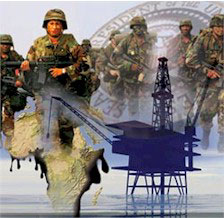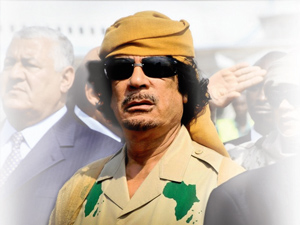Algeria, Mali crisis part of West’s strategy to dominate Africa's resources
By Brian E. Muhammad -Contributing Writer- | Last updated: Feb 5, 2013 - 10:59:41 AMWhat's your opinion on this article?

|
However the bloodshed that gripped the desert Sahel expanse of Northern and Western Africa could be examined in the context of the geo-strategic importance of Africa for Western nations and the struggle to remain relevant powers in this century and beyond.
The fall of Muammar Gadhafi and Libya in October 2011 and historical struggles between Berber ethnic groups and several governments across the region must also be considered.
As economic disorder, crippling austerity measures and massive dissatisfaction threatens to implode some nations in Europe and a financial debt crisis pounds the United States; resource rich Africa is front and center and seen by Western Imperialists as the last frontier for their survival.
“America will never be a super power in the twenty first century if she doesn’t have access to those strategic metals and minerals,” said Nation of Islam Minister Louis Farrakhan on several occasions, giving an analysis of the decline of the Western world.
Africa watchers say the crises in the Sahel is the latest move in Western efforts to retake Africa and control her vast reserves of oil, gold, uranium and other resources especially in light of competing economies like China, India and Russia.
“It’s neo-colonialism, because they’re still using African surrogates,” said Abayomi Azikiwe, political analyst and editor of Pan African Newswire. Neo-imperialistic France, Britain, America and an African military force from Nigeria, Togo, Niger and Benin have been engaging in battles in Northern Mali where territory was taken by groups reportedly seeking autonomy with an “Islamist” agenda.
According to some analysts, the crisis in Mali triggered the incident in Algeria and highlighted the vulnerability of the whole region as a consequence of foreign-induced ousting of Muammar Gadhafi . Minister Farrakhan predicted murdering the Libyan leader would set the stage for more mayhem, devastation and conflict.
“What just happened has let the dogs of destruction out,” the Muslim leader warned in an October 2011 interview days after Col. Gadhafi’s brutal assassination by Western supported insurgents.

Muammar Gadhafi
|
“Muammar Gaddafi warned the U.S., Britain and France that the terrorists they were supporting were behind the unrest in Libya,” said AfriSynergy Commentator Thea West in a Jan. 24 Facebook posting.
“These Western leaders knew Gaddafi was telling the truth because some of them knew they were collaborating with terrorists to achieve their goals in Libya and throughout Africa,” he added.
All African governments are now under threat of Western military intervention and there are questions about their political will and capacity to resist. With the ousting of Muammar Gadhafi the doors of imperialism are wide open.
In the ruin and aftermath of Libya came the question of independence for minority Tuareg factions and Berber populations, who received military training in the war to oust Col. Gadhafi . Experts cautioned that they were regional threats because of a historical struggle for self-determination as an indigenous people scattered throughout North Africa. They are present but marginalized in Morocco, Algeria, Tunisia, Mali, and Niger. Analysts say after the downfall of Libya many among this group returned to countries in the region and pursued their self-interest particularly in Northern Mali.
According to writer Ramzy Baroud in a piece posted at PressTV.com, weapons from NATO’s war in Libya found their way to rebel and militant groups throughout the region. Some Tuaregs supported by Col. Gadhafi dispersed following the war on Libya. “Many of them returned to Mali, battle-hardened and emboldened by the advanced weapons,” wrote Mr. Baroud.
Mr. West argued the plot was to unleash the cache of weapons in Libya into other parts of Africa, “seed chaos” and justify Western moves to declare a Right to Protect civilians. This would mean insertion of American and other Western military throughout at least 75 percent of Africa, he wrote.
“Why? It is to maintain the economic status quo of European and American corporations competing against China’s economic partnership model in Africa. Military might is to be used as France has used its military in Africa for decades which is to bully Africans to contract with Western corporations, not Chinese,” he added.
As threats against French interests surged in Northern Africa following the fighting in Mali, France ordered its forces to protect uranium mines in Niger run by the Paris-owned Areva, a nuclear power company. Niger is a former French colony and has huge uranium deposits needed for nuclear technology.
France produces upwards of 75 percent of its electricity from nuclear reactors and most of the uranium used to fuel the reactors is mined in Niger.
Mr. Azikiwe said wider spreading conflict is a real possibility considering increased U.S. militarization of Africa through AFRICOM-the U.S. military command for the Motherland. The Obama administration previously announced deployment of 3,500 Special Forces and military trainers to 35 African nations supposedly to fight Islamic extremism.
Going back over several U.S. administrations, America has courted governments in the Sahel region to encourage support of U.S. influence and meddling under the public face of fighting “Al-Qaeda in the Maghreb” or any reasonable facsimile of it.
But the trouble in the Sahel also exposes the weakness of the African Union to respond to foreign meddling in African affairs. Washington has now prioritized AFRICOM and the U.S. presence in Africa at a time when resistance from African leadership is weak and cautious.
This year the AU marks its 50th year since the founding of its forerunner, the Organization of African Unity, by African independence leaders Dr. Kwame Nkrumah of Ghana, Sekou Toure of Guinea, Gamal Abdel Nasser of Egypt and others.
“Gadhafi had warned against this and that’s why he advocated the formation of a million person African legion to deal with these kind of contradictions when they come up on the continent,” said Mr. Azikiwe.
Kwame Nkrumah promoted continental unification and advocated an all-African military high command to answer African internal conflicts and counter threats of foreign intrusion. Decades later, however, it appears African leadership has been sidelined by Western powers, and cannot independently solve the crises of North and West Africa.
Pan African observers say any African leader championing unification, economic and political independence is a threat and gets targeted as the West conspired to overthrow Mr. Nkrumah in 1966 and Col. Gadhafi in 2011.
France stepped in “under the guise that they want to help” the Malian army, the same army that staged a coup against a democratically elected government, argued Mr. Azikiwe.
The whole affair has placed the African Union and the regional Economic Community of West African States (ECOWAS) in a precarious position. The Malian military was trained by AFRICOM and Capt. Amadou Haya Sanogo, the coup leader, was educated in the military in America.
Both ECOWAS and the AU cannot take a progressive and independent stand against foreign troops on the continent because many of their member countries have military ties to the Pentagon. Furthermore they are economically dependent on multinational corporations in Western markets to buy their minerals, oil and natural gas.
“The greater degree of their intervention in the military affairs and the economic affairs of Africa, the greater the instability,” said Mr. Azikiwe.
Related news:
Africa the new focus of Western Domination (FCN, 01-2013)
Turmoil and contradictions: Has African Union lost its way? (FCN, 07-16-2012)
INSIDE STORIES AND REVIEWS
-
-
About Harriett ... and the Negro Hollywood Road Show
By Rabiah Muhammad, Guest Columnist » Full Story -
Skepticism greets Jay-Z, NFL talk of inspiring change
By Bryan 18X Crawford and Richard B. Muhammad The Final Call Newspaper @TheFinalCall » Full Story -
The painful problem of Black girls and suicide
By Charlene Muhammad -National Correspondent- » Full Story -
Exploitation of Innocence - Report: Perceptions, policies hurting Black girls
By Charlene Muhammad -National Correspondent- » Full Story -
Big Ballin: Big ideas fuel a father’s Big Baller Brand and brash business sense
By Bryan Crawford -Contributing Writer- » Full Story






 Click Here Stay Connected!
Click Here Stay Connected!








